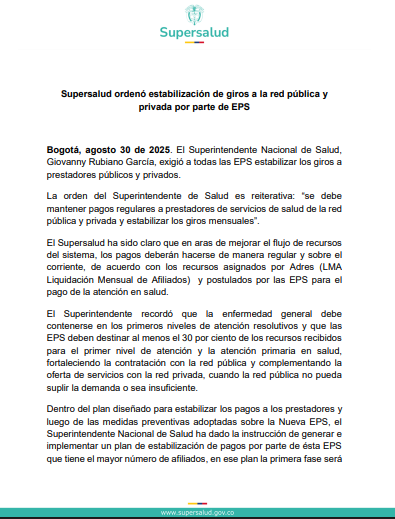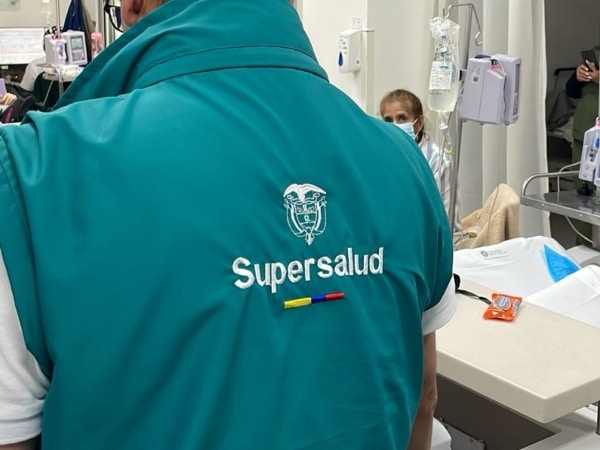The Health Superintendency orders all EPSs to stabilize operations and maintain regular payments to public and private health service providers.

The National Health Superintendent, Giovanny Rubiano García, issued an official statement demanding that all EPSs in the country stabilize payments to public and private health service providers.
As stipulated, the regularity of monthly payments must be guaranteed, and a constant flow of resources must be maintained to ensure the sustainability of the institutions that make up the healthcare network.
According to the National Health Superintendency, payments must be made regularly and on time, based on the resources allocated by the Administrator of the General Health Social Security System (Adres) through the Monthly Settlement of Affiliates (LMA) and submitted by the EPSs to cover health care.

Official statement from the Superintendency of Health. Photo: Taken from Supersaud.
In the statement, the Superintendent noted that containment of the disease should be prioritized at the first, most decisive levels of care.
In this regard, EPSs are required to allocate at least 30% of the resources received to primary and primary health care, strengthening contracting with the public network and complementing the service offering with the private network when the public network's capacity is insufficient.
As part of the plan designed to stabilize payments, and following the preventive measures adopted for the Nueva EPS, the Superintendency indicated that this entity must implement a payment stabilization plan. This plan includes a first phase focused on organizing payments to low-complexity hospitals and a second phase that includes medium- and high-complexity hospitals.
Similarly, the Superintendency reported that, in order to improve the flow of resources, the Assurance Delegation has designed nine technical committees.
Two such meetings have been held so far: one in the city of Cali and another in Tunja. These meetings were attended by EPSs and second, third, and fourth-level service providers from the departments of Boyacá, Norte de Santander, Cauca, Valle del Cauca, and Nariño.

The Supersalud Institute created regulations to strengthen the oversight of pharmaceutical managers. Photo: Supersalud
With these actions, the National Health Superintendency seeks to ensure that the flow of resources in the system is stable, timely, and sufficient for the adequate provision of health services throughout the country.
Surveillance of pharmaceutical managers On the other hand, the Supersalud issued External Circular 2025151000000009-5 of 2025, the first technical regulation aimed at strengthening the inspection, surveillance, and control of pharmaceutical managers.
The measure seeks to ensure a more timely delivery of health technologies—such as medications and medical devices—to members of the General Social Security Health System (SGSSS), addressing one of the main complaints from users: delays in dispensing.

This regulation is a response to one of the main concerns in the healthcare system. Photo: Istock
With this circular, which goes into effect in October 2025, administrators must report to the Supersalud (Health Superintendency) detailed information about their operations , the capacity of their service points, user wait times, current contracts with the Payment Entities, and their population coverage. In addition, they must identify and explain any difficulties in dispensing medications and medical devices.
Failure to comply with these guidelines may result in administrative sanctions,
ANGELA MARIA PÁEZ RODRIGUEZ
LATEST NEWS EDITORIAL
eltiempo





